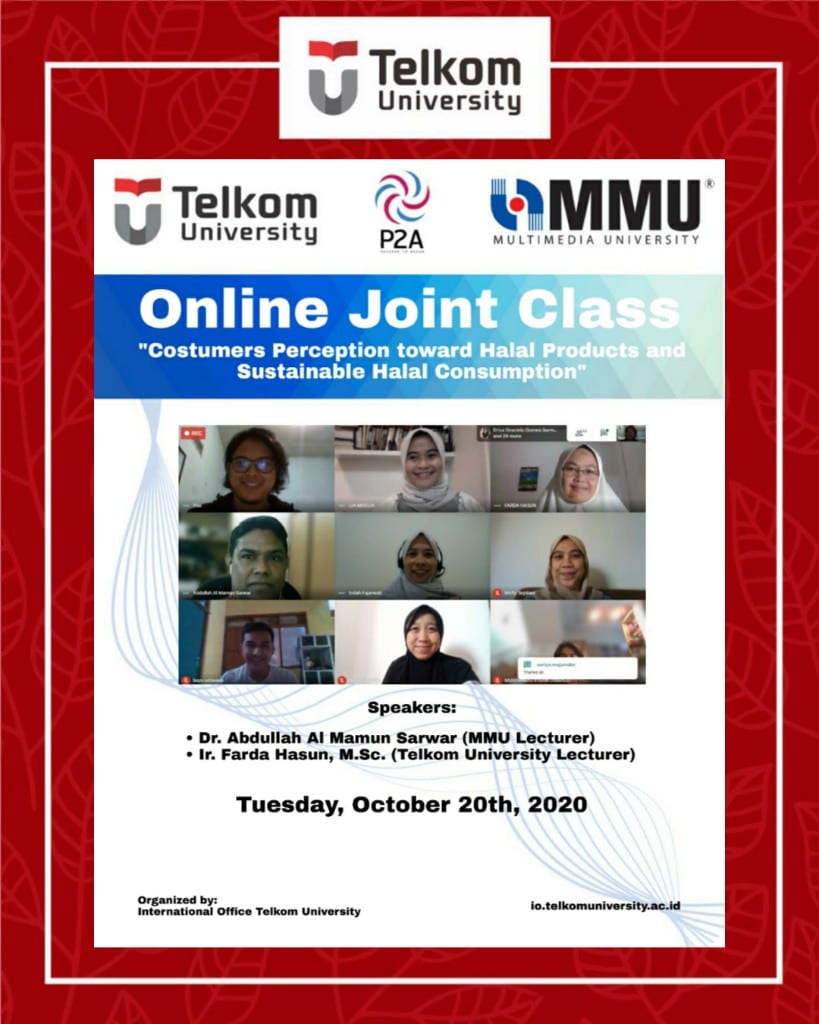
Consumers’ Perception toward Halal Products and Sustainable Halal Consumption, the 19th Online Joint Class Tel U & MMU
Consumers’ Perception toward Halal Products and Sustainable Halal Consumption, the 19th Online Joint Class Tel U & MMU. The last session of the Online Joint Class between Telkom University and Multimedia University Malaysia was successfully held on October 20th, 2020. Dr. Abdullah Al Mamun Sarwar, a lecturer of Multimedia University Malaysia, and Ir. Farda Hasun, M.Sc, a lecturer of Telkom University discussed about Consumers’ Perception toward Halal Products and Sustainable Halal Consumption, to a number of participants from both Indonesia and Malaysia.
Currently, the demand for halal products is increasing along with the level of awareness of Muslim consumers about the importance of the halal label on the products they consume/use. With the increasing demand for various halal products along with improved supply chain management, it is a key factor that drives overall industry demand. According to Waqar Ahmed (2018), cited in Dr. Abdullah presentation, halal product is not only related to the food but also to pharmaceuticals, cosmetics, health products, toiletries and medical devices as well as service sector components such as logistics, marketing, print and electronic media, packaging, branding, and financial.
So, what is halal? The word “halal” is derived from Arabic language meaning “allowed” or “permitted”, (Ambali & Bakar, 2014; Wilson & Liu, 2010). To make it more specially, halal refers acceptable activates based on the Holy Qur’an. Halal concept instructs that producers must also emphasize on the cleanliness and hygiene of the environment from raw materials to finished goods. Manufactures and marketers use the halal certification and logo as a way to inform and to reassure their target consumers that their products are halal and Shariah compliant. However, currently there is no single standard that is recognized worldwide. The worldwide Halal Council which monitors the various certification bodied has not been able to come up with a single standard for its members.
Based on Ms. Farda, in Islamic guidance, consumption is guided by several principles, including:
- Shariah principle, dealing with the aqidah principle, scientific principle, and amaliah principle.
- Quantity principle, related to the quantity consumption which has to be moderate not excessively or sparingly.
- Consumption priority, dealing with the priority level (primary, secondary, and tertiary) and fulfillment of basic needs including zakat, infaq, etc.
- Social principle, dealing with sharing principle without harming others.
- Protection of the environment, related to the use of the environment without exploiting/harming it.
In conclusion, for industrial food makers, understanding of why and how consumers perceive halal food products will help them in increasing their knowledge and also maximize their profit in the market. Thus, this would be an opportunity for many manufactures, including food or other products manufactures (especially the non-Muslim manufactures) in tapping the Muslim market.(IO)***
